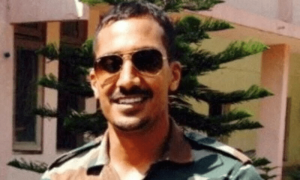ISLAMABAD: The Supreme Court on Thursday ordered a stay of execution of six militants convicted by military courts, after a petition seeking a halt to the implementation of death sentences awarded by military courts was filed by the Supreme Court Bar Association (SCBA) yesterday.
“The execution of military courts' death sentences, those which have already been awarded and those which will be awarded, is suspended,” Chief Justice Nasir ul Mulk told the Supreme Court.
Those convicted by military courts could appeal against their sentences, he added.
Read: SCBA seeks stay of execution of militants sentenced to death by military courts
The apex court also issued a notice to Attorney General Salman Aslam Butt with regards to its order.
The petition — which was filed by human rights activist Asma Jehangir on behalf of the SCBA — requested the SC to halt the implementation of death sentences awarded by military courts until a 17-judge full court took up challenges pertaining to the 21st constitutional amendment, especially the establishment of military courts.
Take a look: Parliament passes 21st Constitutional Amendment, Army Act Amendment
The hearing was adjourned to April 22 after it emerged that the wife of a judge in the full court suffered from a heart attack.
Know more: SC bench refers petitions challenging 18th, 21st amendments to CJP
The petition said that if the convicted militants are sentenced to death before the Supreme Court disposes the case challenging the establishment of military courts, justice will be compromised.
Read: Military courts announce death sentences of six convicts
On April 2, Chief of Army Staff (COAS) Gen Raheel Sharif had ratified the death sentence awarded by military courts to six Tehreek-i-Taliban Pakistan (TTP) militants and life-imprisonment to one.
The decision evoked a strong reaction from legal experts and rights activists.
“It is, therefore, respectfully prayed that this court be pleased to pass an ad interim order staying execution of the persons sentenced to death by the military courts under the jurisdiction extended to it by the Pakistan Army (Amendment) Act 2015, till final disposal of its petition,” the SCBA said.
Also read: Military ‘justice’
The petition argued that the 21st Amendment by itself did not dismiss observance of fundamental rights guaranteed in the Constitution. It said that despite efforts the petitioner had failed to get information whether Articles 10, 10A, 12, 13 and 14 which ensured safeguards to arrest and detention, fair trial, protection against retrospective punishment, protection against double punishment and inviolability of dignity of persons had ever been applied by military courts during the trial process.
Also read: SC to take up pleas against 21st Amendment
Expressing concern over the way the accused were treated, Asma Jehangir raised a number of questions in the petition and asked whether the persons arrested were enemy aliens and, if not, were they informed about the reasons for the arrest; whether they were given the right to consult and be defended by legal practitioners of their choice and whether the accused were produced before a magistrate within 24 hours.
The petitioner contended that rights of the accused were not protected through a fair trial and by observing the established principles of due process as guaranteed under Article 10A.
Jehangir said that protection against retrospective punishment had not been extended to the accused and asked whether they were tortured for the purpose of extracting evidence.
Read: 17-judge bench to decide fate of 18th, 21st amendments
“All these factors are crucial for protecting individuals against arbitrary trials,” the petition said, adding that as a guardian of the Constitution, the Supreme Court had to ensure that fundamental rights were extended to persons arrested and tried within Pakistan.
Also read: Decision to set up military courts undermines judiciary: HRCP
The recent trials by the military courts were neither made public nor were they transparent, it said, adding that military trials did not ordinarily observe principles of due process and, therefore, the apprehensions of the petitioner were genuine and had merits.
Those sentenced to death penalty, the petition argued, were especially vulnerable because if “it is executed it will be irreversible”.













































